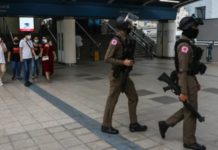Acting Prime Minister General Prawit Wongsuwan has once again instructed related agencies to come up with measures to encourage and help people to install a solar rooftop system at their houses to tackle rising energy prices.
Gen. Prawit asked about updates on the project at the Energy Policy and Planning Office’s meeting on September 9.
At the Cabinet meeting week, he instructed the Interior Ministry, the Energy Ministry, the Metropolitan Electricity Authority (MEA) and the Provincial Electricity Authority (PEA) at the Cabinet meeting to come up with tangible measures soon.
Government Spokesman Anucha Burapachaisri said the government’s plan is to make solar rooftops and its installation more affordable for every household.
People will also be able to send unused electricity that they generated during the daytime to the main grid to cancel out the electricity that they used from the main grid at nighttime. Both MEA and PEA were tasked to come up with this measure.
Anucha said the measures to encourage people to install solar rooftop will also create jobs, lower the country’s carbon emission and lower the country’s dependency on the import of energy from abroad.
The government ended the restriction on households and commercial buildings selling of power generated by their solar rooftops to state utilities since 2017.
The buying rate was fixed at below 2.60 Baht per kilowatt-hour.
The Department of Alternative Energy Development and Efficiency (DAED) said on September 19 there are now around 120 applications of solar rooftop installation per day.
DAED’s Director General Prasert Sinsukprasert said the department already streamlined the application process to install solar rooftop system which usually took 60 days down to 30 days.
The increase in solar rooftop application came after the government’s decision in July to increase the fuel adjustment tariff (FT) rate for electricity from 4 Baht to 4.72 Baht for the billing period of September and December.
The government has yet to mention if one of the measures would be to provide subsidy for the installation of a solar rooftop system. For example, the Indian government is now offering a 40% subsidy for 3 kilowatt system and 20% subsidy beyond 3 kW and up to 10 kW.
According to Krungthai Compass, the prices of solar panels in Thailand today already dropped by 66% when compared to the prices in 2013. – Thai Enquirer
A quick glance at the prices of solar rooftop system installation in Thailand:
- 83,500-85,000 Baht for a 1.5 kW system which would be enough to power 5 LED lightbulbs, a refrigerator, a television and an air conditioner
- 145,000 Baht for a 3-kW system which would be enough to power 10 LED lightbulbs, 2 refrigerators, 3 television sets and 2 air conditioners
- 330,000 Baht for a 5 kW system which would be enough to power 20 LED lightbulbs, 3 refrigerators, 5 television sets and 4 air conditioners
- 430,000 Baht for a 10 kW system which would be enough to power 40 LED lightbulbs, 3 refrigerators, 6 television sets and 6 air conditioners
- 690,000-999,000 Baht for a 20 kW system which would be enough to power 80 LED lightbulbs, 6 refrigerators, 12 television sets and 12 air conditioners




































